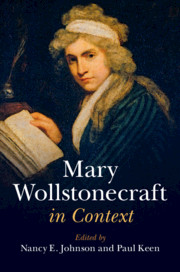Book contents
- Mary Wollstonecraft in Context
- Mary Wollstonecraft in Context
- Copyright page
- Contents
- Illustrations
- Notes on Contributors
- Preface
- Frontispiece
- Chronology
- Part I Life and Works
- Chapter 1 Biography
- Chapter 2 Correspondence
- Chapter 3 Family
- Chapter 4 Joseph Johnson
- Part II Critical Fortunes
- Part III Historical and Cultural Contexts
- Suggested Further Reading
- Index
Chapter 4 - Joseph Johnson
from Part I - Life and Works
Published online by Cambridge University Press: 16 January 2020
- Mary Wollstonecraft in Context
- Mary Wollstonecraft in Context
- Copyright page
- Contents
- Illustrations
- Notes on Contributors
- Preface
- Frontispiece
- Chronology
- Part I Life and Works
- Chapter 1 Biography
- Chapter 2 Correspondence
- Chapter 3 Family
- Chapter 4 Joseph Johnson
- Part II Critical Fortunes
- Part III Historical and Cultural Contexts
- Suggested Further Reading
- Index
Summary
During the eighteenth and early nineteenth centuries, the most significant booksellers were both retailers and publishers, financing books and their distribution.1 In an 1809 Gentleman’s Magazine obituary, John Aikin honored Joseph Johnson as “the Father of the Trade.” Averse to “puffing and parade” and “typographical luxury,” his “kindness of heart” was evident and his “house and purse were always open to the calls of friendship, kindred, or misfortune.”2 For Lyndall Gordon, he was “less an employer than a mentor” to Wollstonecraft, fostering her literary career.3 Their relationship exemplifies the ascendancy of booksellers in eighteenth-century literary culture. As they came to dominate a commercialized cultural marketplace, they appropriated some of the power to shape public taste previously associated with aristocratic patrons. Commercially successful booksellers like Johnson could promote particular interests and causes through publications. His support for Wollstonecraft contributed to a critical project, stimulating public debate on religious and political liberty. John Bugg connects Johnson’s commitment to publishing different opinions on contentious subjects to Dissent, as “a specific practice of supporting the collision of opinion,” which by the later 1790s could be construed as subversive.4
- Type
- Chapter
- Information
- Mary Wollstonecraft in Context , pp. 29 - 38Publisher: Cambridge University PressPrint publication year: 2020

